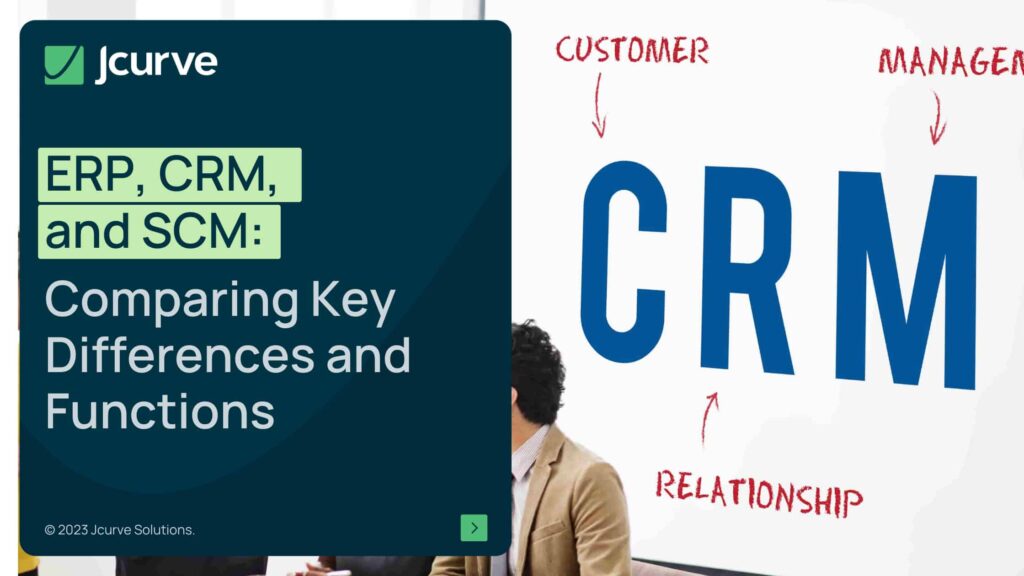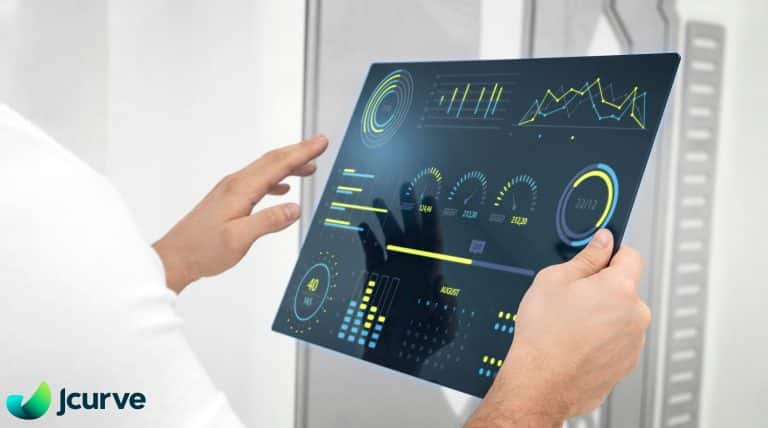In a fast-paced business environment, understanding the core systems that drive organizational efficiency and customer satisfaction is paramount. Enterprise Resource Planning (ERP), Customer Relationship Management (CRM), and Supply Chain Management (SCM) are three critical technologies that, while distinct in their functionalities, are increasingly integrated within businesses to streamline operations and enhance decision-making.
Key Takeaways:
- SCM optimizes the supply chain, CRM enhances customer relationships, and ERP streamlines overall business operations.
- Integrating SCM, CRM, and ERP creates a powerful structure that boosts efficiency, enhances customer satisfaction, and ensures smooth data exchange across the business.
What is ERP?
The origins of ERP trace back to the 1960s with the development of material requirements planning (MRP) systems, which expanded during the 1980s and 1990s to include a wider array of business functionalities.
It was in 1990 that the term “enterprise resource planning” was coined by Gartner, a research firm. This terminology shift acknowledged the adoption of such systems across various industries, not just manufacturing, aiming to enhance the efficiency of their entire operational processes. With the rise of the internet and advancements in cloud computing, ERP solutions have undergone significant transformation, now offering greater accessibility and flexibility to companies of diverse sizes.
The ERP market has been experiencing robust growth, with an increasing shift towards cloud-based solutions offering more flexibility and scalability. According to a report by Grand View Research, the global ERP software market is expected to reach USD 96.04 billion by 2027, growing at a compound annual growth rate (CAGR) of 10.2% from 2020 to 2030.
Enterprise Resource Planning (ERP) systems are comprehensive software platforms designed to integrate and manage all the key operations of a business, including finance, HR, manufacturing, supply chain, services, procurement, and others. Read more about ERP here.
Key Components and Functionalities of ERP:
- Finance and accounting: streamlines financial operations and reporting
- Human resources: manages employee information, payroll, recruitment, and training
- Manufacturing and supply chain: optimizes production planning, inventory control, and order fulfillment
- Customer Relationship Management: supports sales, customer service, and marketing processes
Gartner anticipates a significant shift in the ERP landscape, predicting that as of 2023, 65% of organizations will employ ERP applications that embody characteristics of the fourth era of ERP technology.
This new phase is defined by five key hallmarks: AI-driven analytics, data-centric operations, consumer-grade user experiences, augmented human capabilities, and an emphasis on enabling direct customer interactions.
For businesses looking to harness the new generation ERP capabilities, partnering with Jcurve for consulting, implementation, and integration of NetSuite ERP is a strategic move to ensure seamless adoption and maximization of ERP investments in this innovative era.
What is CRM?
Customer Relationship Management (CRM) systems are designed to manage a company’s interactions with current and potential customers. By compiling customer data across different channels or points of contact, CRM systems provide a comprehensive view of customer activities, preferences, and feedback. This enables businesses to personalize customer interactions, enhance sales, and improve customer service.
CRM systems have evolved from simple contact management systems to sophisticated platforms integrating sales, marketing, and service. The rise of social media and mobile technology has further expanded CRM capabilities, enabling real-time customer engagement and analytics.
Key Components and Functionalities of CRM:
- Contact management: stores customer information such as contact details, purchase history, and communication history in a central database
- Sales management: tracks sales activities, leads, and opportunities
- Marketing automation: automates repetitive tasks for marketing campaigns and customer segmentation
- Customer service and support: manages customer inquiries, complaints, and service requests
What is SCM?
Supply Chain Management (SCM) systems are critical for managing the flow of goods and services from the procurement of raw materials to the delivery of the final product to the consumer. Effective SCM ensures operational efficiency, reduces costs, and improves customer satisfaction by ensuring the right product is delivered at the right time.
SCM has evolved from manual, paper-based processes to advanced, technology-driven solutions that incorporate real-time data analytics and forecasting. Innovations such as the Internet of Things (IoT), artificial intelligence (AI), and blockchain are set to redefine SCM strategies and operations.
Key Components and Functionalities of SCM:
- Procurement: manages the acquisition of goods and services
- Production planning and scheduling: optimizes manufacturing processes
- Inventory management: controls stock levels to meet demand without excess
- Logistics and transportation: oversees the movement of goods from suppliers to customers
Discover more about the role of ERP in enhancing supply chain efficiency, optimizing order fulfillment, and increasing customer satisfaction by reading this article on “The Role of ERP in Streamlining supply chain management.”
Benefits for each System (ERP, CRM and SCM)
Enterprise Resource Planning (ERP)
- Centralized data management: All business data is stored in a single, unified system, reducing data silos and inconsistencies.
- Improved operational efficiency: Automates and streamlines business processes, reducing manual work and errors.
- Enhanced financial control and reporting: Provides real-time financial data and automated reporting for better fiscal management.
- Streamlined HR processes: Manages employee data, payroll, and recruitment in one integrated system.
- Better decision-making through real-time data access: Offers instant access to accurate, up-to-date information for informed decision-making.
- Scalability to support business growth: Easily adapts to increasing business complexity and volume as the company expands.
Customer Relationship Management (CRM)
- Enhanced customer insights and segmentation: Provides detailed customer data for better understanding and targeting of customer groups.
- Improved sales pipeline management: Tracks and manages sales opportunities from lead to closure more effectively.
- Better lead capture and nurturing: Automates lead collection and follow-up processes to increase conversion rates.
- More effective marketing campaigns: Enables personalized, data-driven marketing efforts based on customer preferences and behaviors.
- Increased customer satisfaction and loyalty: Improves customer service by providing a 360-degree view of customer interactions.
- Data-driven decision making for customer-facing teams: Offers analytics and reporting tools to guide sales and marketing strategies.
Supply Chain Management (SCM)
- Improved supplier collaboration and relationships: Facilitates better communication and coordination with suppliers for smoother operations.
- Enhanced quality control: Monitors and manages product quality throughout the supply chain to ensure consistency.
- Reduced costs and improved cash flow: Optimizes inventory levels and improves procurement processes to lower operational costs.
- Better risk mitigation through increased visibility: Provides real-time tracking and alerts for potential supply chain disruptions.
- Increased agility and flexibility in operations: Allows for quick adjustments to changing market conditions or customer demands.
- Optimized inventory management: Balances stock levels to meet demand without excess, reducing carrying costs and stock outs.
Integrating ERP, SCM and CRM
| System | Focus Area | Integration Benefits |
| ERP | Business and operations management | Centralized data management, improved operational efficiencies |
| SCM | Supplier relationship management | Enhanced supply chain visibility, better inventory and procurement decisions |
| CRM | Customer Relationship Management | Improved customer insights, enhanced service and engagement |
NetSuite ERP: A Unified Approach to SCM, CRM, and ERP
NetSuite ERP stands as a premier cloud-based solution, offering a suite of tools designed to streamline business operations, enhance efficiency, and drive growth across various industries. This platform encompasses a wide array of functionalities tailored to meet the diverse needs of modern enterprises.
This efficiency not only streamlines workflows but also reduces costs and fosters cross-departmental collaboration. Its customizable features support smooth production and adapt to business growth, ensuring both scalability and flexibility.
Financial Management: NetSuite ERP provides robust financial management capabilities, enabling businesses to automate financial processes, reduce manual entry, and ensure compliance with accounting standards. It offers comprehensive tools for financial tracking and reporting, including real-time visibility into financial performance.
Inventory Management: With advanced inventory management features, NetSuite ERP allows companies to manage inventory levels, orders, and supply chain processes efficiently. This facilitates optimal stock levels, minimizes carrying costs, and improves order fulfillment accuracy.
Order Management: Streamlining the order-to-cash process, NetSuite’s order management system automates and optimizes the flow from order capture to billing, enhancing customer satisfaction through timely and accurate order processing.
Production Management: For manufacturing businesses, NetSuite ERP offers production management tools that support the entire product lifecycle. From product planning and scheduling to shop floor execution and quality assurance, it enables manufacturers to maintain high levels of efficiency and product quality.
Supply Chain Management: NetSuite ERP provides a comprehensive view of the supply chain, offering features for supply chain planning, vendor management and procurement. This ensures that businesses can effectively manage their supply chain operations, reduce costs and improve supplier relationships.
Warehouse and Fulfillment: Enhancing warehouse operations, NetSuite ERP integrates warehouse management with other business processes to streamline pick, pack, and ship activities. This improves warehouse efficiency, reduces handling costs, and accelerates delivery times.
Conclusion
The integration of Enterprise Resource Planning (ERP), Customer Relationship Management (CRM), and Supply Chain Management (SCM) systems represents a critical strategy for modern businesses aiming to optimize operations and maintain competitiveness. These interconnected systems form a comprehensive framework that streamlines processes, enhances decision-making, and improves customer satisfaction. ERP centralizes core business functions, CRM manages customer interactions, and SCM optimizes the flow of goods and services. When integrated, as exemplified by solutions like NetSuite ERP, these systems create a powerful synergy enabling real-time data sharing, improved efficiency, and informed strategic planning. As businesses navigate an increasingly complex environment, the adoption of integrated ERP, CRM, and SCM systems becomes crucial for creating agile, data-driven, and customer-centric organizations capable of adapting to market demands and achieving long-term success.










